Genocide denial gains ground 25 years after Srebrenica massacre
Even as remains continue to be identified, denialism is moving from far-right fringe into mainstream
by Shaun Walker in Srebrenica THE GUARDIAN Fri 10 Jul 2020
by Shaun Walker in Srebrenica THE GUARDIAN Fri 10 Jul 2020
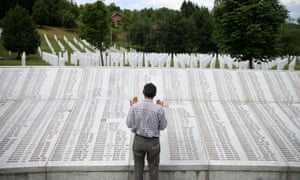
A genocide survivor prays near the graves of his father and two brothers at the memorial centre near Srebrenica. Photograph: Dado Ruvić/Reuters
At the genocide memorial centre outside Srebrenica, thousands of simple white gravestones stretch across the gently inclined hillside for as far as the eye can see.
Nearby, over a number of days in July 1995, Bosnian Serb forces systematically murdered around 8,000 Bosniak (Bosnian Muslim) men and boys. It was the worst crime of the Bosnian war, and remains the only massacre on European soil since the second world war to be ruled a genocide.
Even today, remains of victims are still being found and identified. Owing to a cover-up operation to hide the crimes by digging up and dispersing the contents of mass graves, there are cases in which partial remains of the same individual have been found at as many as five sites several miles apart. At a 25th anniversary commemoration on Saturday, at least eight more victims will finally be laid to rest at the cemetery.
A quarter of a century after the events, however, the truth about what happened at Srebrenica is being subjected to a growing chorus of denial, starting in Bosnia itself and echoing around the world, moving from the fringes of the far right into mainstream discourse.
At the genocide memorial centre outside Srebrenica, thousands of simple white gravestones stretch across the gently inclined hillside for as far as the eye can see.
Nearby, over a number of days in July 1995, Bosnian Serb forces systematically murdered around 8,000 Bosniak (Bosnian Muslim) men and boys. It was the worst crime of the Bosnian war, and remains the only massacre on European soil since the second world war to be ruled a genocide.
Even today, remains of victims are still being found and identified. Owing to a cover-up operation to hide the crimes by digging up and dispersing the contents of mass graves, there are cases in which partial remains of the same individual have been found at as many as five sites several miles apart. At a 25th anniversary commemoration on Saturday, at least eight more victims will finally be laid to rest at the cemetery.
A quarter of a century after the events, however, the truth about what happened at Srebrenica is being subjected to a growing chorus of denial, starting in Bosnia itself and echoing around the world, moving from the fringes of the far right into mainstream discourse.
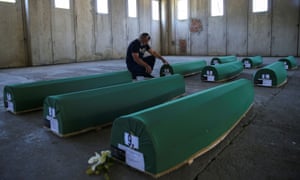
Coffins containing remains of newly identified victims before their burial. Photograph: Dado Ruvić/Reuters
In Srebrenica, the denial starts with the mayor. The current population of around 7,000 is one-fifth of the pre-war total, and there are now more Serbs than Bosniaks, a reversal of the situation before the war and genocide. Four years ago, Srebrenica elected its first Serb mayor, Mladen Grujičić, and official rhetoric changed overnight.
Grujičić, 38, an energetic former chemistry teacher, has no time for talk of genocide. “No Serb would deny that Bosniaks were killed here in horrible crimes … but a genocide means the deliberate destruction of a people. There was no deliberate attempt to do that here,” he said in an interview at his office in the centre of Srebrenica.
He was 10 when the war started. His father was killed during the war in a village not far from Srebrenica. Grujičić pointed out that there were victims on all sides during the conflict, which tore apart multi-ethnic Bosnia after the collapse of Yugoslavia.
But what about the international courts that have forensically sifted the evidence and come to the conclusion that the systematic slaughter around Srebrenica in July 1995 did constitute genocide, unlike other crimes during the war? “Unfortunately, all these courts have been biased against the Serbs and this has only deepened divisions here,” he shrugged. He has not once during his time in office visited the genocide memorial, which is a five-minute drive from the town hall.
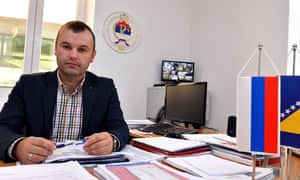
Mladen Grujičić, the Srebrenica mayor. Photograph: Elvis Barukcic/AFP/Getty Images
His views are in line with those of most Serb politicians in Republika Srpska, the Serb-dominated entity that makes up half of Bosnia’s complicated post-war political system. Milorad Dodik, the Serb member of Bosnia’s tripartite presidency, has called the Srebrenica genocide “a fabricated myth”, and the Republika Srpska authorities have set up a commission to investigate the events. Its report, due later this year, is expected to whitewash the crimes of Bosnian Serb forces.
“This is the next phase, even worse than genocide denial: to try to create a new historical reality,” said Serge Brammertz, who spent nearly a decade as chief prosecutor at the UN international criminal tribunal for the former Yugoslavia in The Hague. The tribunal convicted the Bosnian Serb political leader Radovan Karadžić and the military commander Ratko Mladić of genocide, war crimes and crimes against humanity. Mladić’s appeal is still under way.
The genocide has long been an inspiration for far-right extremists and Islamophobes. The Christchurch mosque attacker last year played a song glorifying Karadžić just prior to the assault, and years earlier Anders Breivik also sought inspiration in the Balkan wars and Serb ultra-nationalism.
Recently, however, questioning the genocide has been gaining more mainstream approval. Most infuriating for survivors was the award of last year’s Nobel prize for literature to the Austrian writer Peter Handke. He had delivered a eulogy at the funeral of the Serbian leader Slobodan Milošević and made a number of revisionist statements about the events of the Bosnian war that have led to accusations of genocide denial.
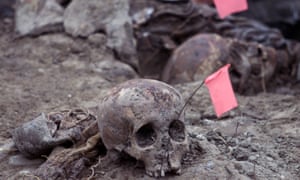
Remains found in a mass grave in the eastern village of Kamenica, believed to have been transferred from Srebrenica. Photograph: Danilo Krstanovic/ReutersIn a press conference before the prize-giving ceremony, when Handke was asked whether he accepted that the Srebrenica massacre had happened, he dodged the question, calling it “empty and ignorant” and comparing it to hate mail he said he had received containing soiled toilet paper.
Emir Suljagić, who runs the sombre genocide memorial centre at Potočari, just outside Srebrenica, said: “I am not a fan of cancel culture but if there’s one thing that should cancel you, surely it’s genocide denial, it’s speaking at Milošević’s funeral.”
The memorial centre is located in the former headquarters of the Dutch UN battalion that in July 1995 failed to protect the people gathered in Srebrenica, which had been declared a UN safe zone. Suljagić, who survived because he worked as a translator for the mission, spoke of the trauma for returnees who have to live in places where the crimes took place. He told a story from his years working as a journalist, covering war crimes trials in The Hague.
Suljagić was watching two former Bosnian Serb soldiers give evidence against their commander at one trial. The men testified under pseudonyms and with their voice and appearance altered, but as they recounted their role in a massacre, Suljagić pieced together their identities from information given to the court. He had been to school with both of them. He assumed they had been given immunity for their role in the massacre in exchange for testifying against their commander.
“Nine years later, I’m in the parking lot of the local supermarket and one of those guys comes out and recognises me and says: ‘Hi, how are you doing?’ They both live locally. And I’m thinking: ‘Do I tell him? Do I tell him I know?’ In the end, I said nothing, but I still see them occasionally.
An aerial view of the memorial centre. Photograph: Dado Ruvić/Reuters
With survivors and perpetrators living side by side, and given the country’s divided politics, it is hard to imagine closure and reconciliation coming soon. Hasan Hasanović, who lost his twin brother and his father in the genocide, said it would be possible to talk about progress when school trips of Serb pupils come to tour the genocide memorial, where he works as a guide.
Schooling, like so much in Bosnia, is still divided along ethnic lines. Pupils are split into separate classes for “national subjects” such as history, and while the Bosniak textbooks cover the genocide, the Serb textbooks gloss it over. There is little hope of a unified curriculum in the country in the foreseeable future. “The main nationalist parties that continue to benefit from social division have no interest in changing a divisive status quo,” said Valery Perry, of the Democratization Policy Council in Sarajevo.
At Srebrenica’s elementary school, teachers avoid discussing the war at all, said the headmaster, Dragi Jovanović. “Even adults, when we sit together, we simply do not touch these topics ... We are trying not to hurt people’s feelings, and at this point you can’t educate the children without hurting their feelings,” he said.
How, then, would he respond to a pupil who asked why there was such a vast cemetery on the outskirts of town? “I have never been asked such a question,” he said.
25 Years After Srebrenica: No Peace or Reconciliation in West Balkans
Imagine it is 1970 — and still there is no peace or reconciliation between France and Germany. Fast forward to the present and consider the situation in the West Balkans.
By Denis MacShane, July 11, 2020 THE GLOBALIST

Credit: djstanek - www.flickr.com
Takeaways
Imagine it is 1970 and still there is no reconciliation between France and Germany. That’s where the West Balkans are 25 years after the Srebrenica massacre.
Serbia’s president Aleksandar Vucic, a longtime cheerleader of “Serbia über Alles,” earlier in his career was proud to play chess with Ratko Mladic -- the Srebrenica killer-in-chief.
Aleksandar Vucic -- who was Slobodan Milosevic’s Information Minister during the later genocidal attacks on Kosovan villages -- today is making nice with the Chinese.
In line with his love of China’s masters, Aleksandar Vucic has created an elected authoritarianism making Serbia a one-man-rule state.
It weakens Josep Borrell’s position that he cannot speak for a united Europe. Kosovo keeps looking to the US and is hoping for a Biden win.
Belgrade “no war, no peace” politics is keeping the West Balkans from integrating into the EU.
Imagine it is 1970 — and still there is no peace or reconciliation between France and Germany.
Now, fast forward to the present and realize that 25 years after the worst genocidal slaughter of Europeans since the World War Two, there is still no final peace or agreement on the most basic of relations between peoples and states in the West Balkans — the region of Europe between the Alps and the Aegean.
An indisputable war crime
25 years ago, on July 11, 1995 8,000 men and boys were taken out from the Bosnian town of Srebrenica. They were put to death one by one. Serb soldiers had prepared the mass graves with excavators.
They had exactly the right number of plastic handcuffs to fasten arms behind backs. The Serb executioners had been issued with enough bullets for their murder, and given regular coffee breaks in case they got tired.
Truly dark parallels
The world was outraged by Nazi killings in Lidice in what is now the Czech Republic. Then 173 were killed by the SS as revenge for the assassination of Reinhard Heydrich — the Nazi ruler of occupied Bohemia.
In Oradour-sur-Glane in the summer of 1944 the Das Reich Division slaughtered 642 villagers as a reprisal for French resistance attacks on German soldiers hurrying north to take part in the Battle for Normandy.
Those two moments of Nazi murderous brutality are insignificant compared to the genocidal attacks at Srebenica. Yet, for years the political leadership as well as the military commanders responsible for the killings were protected by Serbia where politicians put every obstacle in the path of UN investigators.
The dirt on the hands of Serbia’s president today
A cheerleader for this approach of “Serbia über Alles” was a young politician, Aleksandar Vucic. Now Serbia’s president, he was then proud to play chess with the likes of “General” Ratko Mladic, the Srebrenica killer-in-chief.
Vucic was in the Serbian Radical Party and called for the creation of a Greater Serbia and proclaimed that “For every Serb killed we will kill 100 Muslims.”
Today, Serge Bammertz, the chief prosecutor for the International Criminal Tribunal for the former Yugoslavia, set up by the UN Security Council argues that “a number of alleged genocidists have fled to Serbia and found safe haven there, including political leaders and military commanders.”
Meanwhile, Aleksandar Vucic dominates Serbian politics as President of his country. True to form, the man who then acted as Slobodan Milosevic’s Information Minister during the later genocidal attacks on Kosovan villages and farmers by Serbs during the Kosovo war of liberation 1998-99 today is making nice with the Chinese.
Milosevic’s long reach via his presidential understudy
At the time, Vucic banned foreign TV crews from Belgrade and took control of Serb media to pump out anti-Kosovan propaganda and whip up hate against the Kosovans as they sought their own independence and identity.
Vucic has copied his master, Slobadan Milosevic, in pumping up Serb nationalism as the main political force field in the country. He easily won an election in July which was boycotted by opposition parties.
A China lover
In line with his love of China’s masters, Vucic has created an elected authoritarianism making Serbia a one-man-ruled state. The question now is what he does with his supreme power.
This week, Vucic was received by President Macron and also held talks with the Kosovo prime minister brokered by the European Union’s foreign policy chief, Josep Borrell.
A complete road block
In the 21 years since the end of the Kosovo war and expulsion of the Serb death squads and military from the small Balkan nation, the Serbs have refused to accept that Kosovo is no longer a province of Serbia ruled by Belgrade. It is this denial of reality that blocks any final peace settlement in this small corner of Europe.
Borrell’s predecessors in charge of EU foreign policy — first Britain’s Cathy Ashton then Italy’s Frederic a Mogherini — tried to bring Belgrade and Pristina together but everything foundered on Vucic’s Serb nationalism and refusal to accept the existence of Kosovo.
Also doing Putin’s bidding
Vucic has always had the backing of Putin who enjoys the sight of neither the United States nor the EU able to make a final peace in the West Balkans. Vucic is helped by the short-sighted policy of five EU member states who like Serbia refuse to recognize Kosovo.
Each of them has disputes with neighbors over territorial claims. Romania and Slovakia nonetheless recognize Hungary despite Hungarian irredentism.
Cyprus and Greece recognize Turkey despite opposing Turkish occupation of northern Cyprus. Spain has a problem with Catalonia but the comparison with Kosovo refusing to be ruled by Serbia is absurd.
Europe not united
It does however weaken Borrell’s position as he cannot speak for a united Europe. Kosovo keeps looking to the United States and is hoping for a Biden win. It pins its hopes on the fact that Joe Biden’s beloved late son Beau Biden (who died from cancer) had served in Kosovo and that Joe Biden as Vice President had visited Kosovo to offer U.S. support.
In the 1990s, the complaint laid at the EU’s door was that it failed to stop the Milosevic wars and stamp down on Serb aggression and nationalism which gave rise to Srebrenica.
In 2020, the EU still seems unable to face down Vucic’s Serb nationalism and get Belgrade to accept that its no war, no peace politics is keeping the Western Balkans as a whole from integrating into Europe.
More on this topic
A World of Twenty-Year Cycles?
Serbia and Kosovo — On the Road to Europe?
Letter from Serbia: The EU and the Western Balkans
About
With survivors and perpetrators living side by side, and given the country’s divided politics, it is hard to imagine closure and reconciliation coming soon. Hasan Hasanović, who lost his twin brother and his father in the genocide, said it would be possible to talk about progress when school trips of Serb pupils come to tour the genocide memorial, where he works as a guide.
Schooling, like so much in Bosnia, is still divided along ethnic lines. Pupils are split into separate classes for “national subjects” such as history, and while the Bosniak textbooks cover the genocide, the Serb textbooks gloss it over. There is little hope of a unified curriculum in the country in the foreseeable future. “The main nationalist parties that continue to benefit from social division have no interest in changing a divisive status quo,” said Valery Perry, of the Democratization Policy Council in Sarajevo.
At Srebrenica’s elementary school, teachers avoid discussing the war at all, said the headmaster, Dragi Jovanović. “Even adults, when we sit together, we simply do not touch these topics ... We are trying not to hurt people’s feelings, and at this point you can’t educate the children without hurting their feelings,” he said.
How, then, would he respond to a pupil who asked why there was such a vast cemetery on the outskirts of town? “I have never been asked such a question,” he said.
25 Years After Srebrenica: No Peace or Reconciliation in West Balkans
Imagine it is 1970 — and still there is no peace or reconciliation between France and Germany. Fast forward to the present and consider the situation in the West Balkans.
By Denis MacShane, July 11, 2020 THE GLOBALIST

Credit: djstanek - www.flickr.com
Takeaways
Imagine it is 1970 and still there is no reconciliation between France and Germany. That’s where the West Balkans are 25 years after the Srebrenica massacre.
Serbia’s president Aleksandar Vucic, a longtime cheerleader of “Serbia über Alles,” earlier in his career was proud to play chess with Ratko Mladic -- the Srebrenica killer-in-chief.
Aleksandar Vucic -- who was Slobodan Milosevic’s Information Minister during the later genocidal attacks on Kosovan villages -- today is making nice with the Chinese.
In line with his love of China’s masters, Aleksandar Vucic has created an elected authoritarianism making Serbia a one-man-rule state.
It weakens Josep Borrell’s position that he cannot speak for a united Europe. Kosovo keeps looking to the US and is hoping for a Biden win.
Belgrade “no war, no peace” politics is keeping the West Balkans from integrating into the EU.
Imagine it is 1970 — and still there is no peace or reconciliation between France and Germany.
Now, fast forward to the present and realize that 25 years after the worst genocidal slaughter of Europeans since the World War Two, there is still no final peace or agreement on the most basic of relations between peoples and states in the West Balkans — the region of Europe between the Alps and the Aegean.
An indisputable war crime
25 years ago, on July 11, 1995 8,000 men and boys were taken out from the Bosnian town of Srebrenica. They were put to death one by one. Serb soldiers had prepared the mass graves with excavators.
They had exactly the right number of plastic handcuffs to fasten arms behind backs. The Serb executioners had been issued with enough bullets for their murder, and given regular coffee breaks in case they got tired.
Truly dark parallels
The world was outraged by Nazi killings in Lidice in what is now the Czech Republic. Then 173 were killed by the SS as revenge for the assassination of Reinhard Heydrich — the Nazi ruler of occupied Bohemia.
In Oradour-sur-Glane in the summer of 1944 the Das Reich Division slaughtered 642 villagers as a reprisal for French resistance attacks on German soldiers hurrying north to take part in the Battle for Normandy.
Those two moments of Nazi murderous brutality are insignificant compared to the genocidal attacks at Srebenica. Yet, for years the political leadership as well as the military commanders responsible for the killings were protected by Serbia where politicians put every obstacle in the path of UN investigators.
The dirt on the hands of Serbia’s president today
A cheerleader for this approach of “Serbia über Alles” was a young politician, Aleksandar Vucic. Now Serbia’s president, he was then proud to play chess with the likes of “General” Ratko Mladic, the Srebrenica killer-in-chief.
Vucic was in the Serbian Radical Party and called for the creation of a Greater Serbia and proclaimed that “For every Serb killed we will kill 100 Muslims.”
Today, Serge Bammertz, the chief prosecutor for the International Criminal Tribunal for the former Yugoslavia, set up by the UN Security Council argues that “a number of alleged genocidists have fled to Serbia and found safe haven there, including political leaders and military commanders.”
Meanwhile, Aleksandar Vucic dominates Serbian politics as President of his country. True to form, the man who then acted as Slobodan Milosevic’s Information Minister during the later genocidal attacks on Kosovan villages and farmers by Serbs during the Kosovo war of liberation 1998-99 today is making nice with the Chinese.
Milosevic’s long reach via his presidential understudy
At the time, Vucic banned foreign TV crews from Belgrade and took control of Serb media to pump out anti-Kosovan propaganda and whip up hate against the Kosovans as they sought their own independence and identity.
Vucic has copied his master, Slobadan Milosevic, in pumping up Serb nationalism as the main political force field in the country. He easily won an election in July which was boycotted by opposition parties.
A China lover
In line with his love of China’s masters, Vucic has created an elected authoritarianism making Serbia a one-man-ruled state. The question now is what he does with his supreme power.
This week, Vucic was received by President Macron and also held talks with the Kosovo prime minister brokered by the European Union’s foreign policy chief, Josep Borrell.
A complete road block
In the 21 years since the end of the Kosovo war and expulsion of the Serb death squads and military from the small Balkan nation, the Serbs have refused to accept that Kosovo is no longer a province of Serbia ruled by Belgrade. It is this denial of reality that blocks any final peace settlement in this small corner of Europe.
Borrell’s predecessors in charge of EU foreign policy — first Britain’s Cathy Ashton then Italy’s Frederic a Mogherini — tried to bring Belgrade and Pristina together but everything foundered on Vucic’s Serb nationalism and refusal to accept the existence of Kosovo.
Also doing Putin’s bidding
Vucic has always had the backing of Putin who enjoys the sight of neither the United States nor the EU able to make a final peace in the West Balkans. Vucic is helped by the short-sighted policy of five EU member states who like Serbia refuse to recognize Kosovo.
Each of them has disputes with neighbors over territorial claims. Romania and Slovakia nonetheless recognize Hungary despite Hungarian irredentism.
Cyprus and Greece recognize Turkey despite opposing Turkish occupation of northern Cyprus. Spain has a problem with Catalonia but the comparison with Kosovo refusing to be ruled by Serbia is absurd.
Europe not united
It does however weaken Borrell’s position as he cannot speak for a united Europe. Kosovo keeps looking to the United States and is hoping for a Biden win. It pins its hopes on the fact that Joe Biden’s beloved late son Beau Biden (who died from cancer) had served in Kosovo and that Joe Biden as Vice President had visited Kosovo to offer U.S. support.
In the 1990s, the complaint laid at the EU’s door was that it failed to stop the Milosevic wars and stamp down on Serb aggression and nationalism which gave rise to Srebrenica.
In 2020, the EU still seems unable to face down Vucic’s Serb nationalism and get Belgrade to accept that its no war, no peace politics is keeping the Western Balkans as a whole from integrating into Europe.
A World of Twenty-Year Cycles?
Serbia and Kosovo — On the Road to Europe?
Letter from Serbia: The EU and the Western Balkans
About
Denis MacShane is a Contributing Editor at The Globalist. He was the UK's Minister for Europe from 2002 to 2005 — and is the author of “Brexiternity. The Uncertain Fate of Britain” published by IB Tauris-Bloomsbury, London, October 2019. Follow him @DenisMacShane
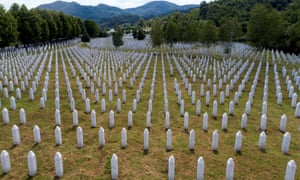
No comments:
Post a Comment